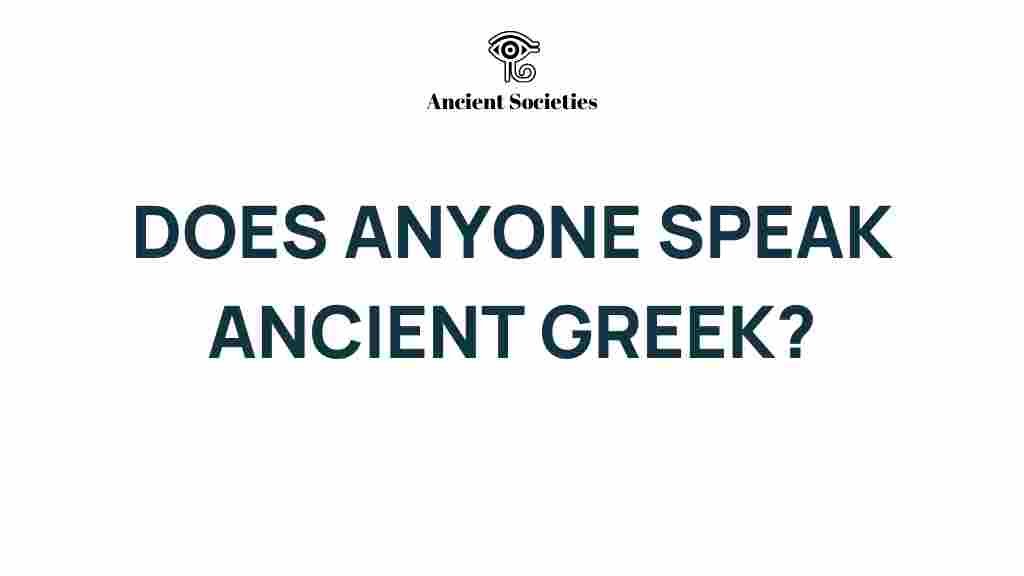Rediscovering Ancient Greek: A Language Lost in Time
Ancient Greek, a language steeped in history, culture, and linguistic heritage, has captivated scholars and enthusiasts alike for centuries. Its influence spreads across various fields such as education, archaeology, and the study of Classics. This article delves into the significance of Ancient Greek, the possibilities for language revival, and how modern individuals can reconnect with this remarkable linguistic heritage.
The Importance of Ancient Greek
Ancient Greek is not just a means of communication; it is a gateway to understanding the foundations of Western civilization. The texts written in Ancient Greek have shaped philosophy, science, and literature. From the works of Homer to Aristotle, the language is a treasure trove of knowledge that continues to inform contemporary thought.
Understanding Ancient Greek allows modern readers to:
- Access primary texts in their original form.
- Gain insights into the cultural and historical context of ancient societies.
- Appreciate the nuances of language that are often lost in translation.
Steps to Rediscovering Ancient Greek
Reviving interest in Ancient Greek involves several key steps that individuals can take to engage with this ancient language.
1. Start with the Basics
Begin your journey by familiarizing yourself with the Greek alphabet. Understanding the characters is crucial for progressing in reading and writing Ancient Greek.
2. Enroll in a Course
Consider enrolling in a course dedicated to Ancient Greek. Many universities and online platforms offer courses ranging from beginner to advanced levels. Look for programs that emphasize:
- Grammar and syntax of Ancient Greek.
- Reading classical texts.
- Understanding historical context.
3. Use Language Learning Resources
Leverage language learning apps, textbooks, and online resources designed for Ancient Greek. Some recommended resources include:
- The Perseus Digital Library – A rich repository of texts and tools for studying Ancient Greek.
- Textbooks such as “Greek: An Intensive Course” by Hardy Hansen and Gerald M. Quinn.
- Online forums and communities for language learners.
4. Engage with the Community
Connecting with fellow learners and experts can enhance your understanding and appreciation of Ancient Greek. Join local or online study groups, participate in discussions, and attend lectures or workshops offered by educational institutions.
5. Read Ancient Texts
Start reading simplified versions of Ancient Greek texts, then gradually progress to original works. Some classic texts to consider include:
- The Iliad by Homer
- Plato’s dialogues
- Works by Euripides and Sophocles
6. Explore the Intersection of Archaeology and Language
Understanding the archaeological context of Ancient Greek can greatly enhance your learning experience. Visit museums, archaeological sites, and exhibitions that focus on ancient Greek culture. This exploration will deepen your appreciation for the language and its historical significance.
Troubleshooting Common Challenges
Learning Ancient Greek can be a challenging endeavor. Here are some common obstacles learners face and tips to overcome them:
1. Difficulty with Grammar
The grammar of Ancient Greek is complex, with various cases, tenses, and moods. To tackle this:
- Practice regularly to reinforce grammatical rules.
- Utilize grammar workbooks specifically designed for Ancient Greek.
- Seek help from instructors or online forums when stuck.
2. Limited Vocabulary
Expanding your vocabulary can feel overwhelming. To enhance your word bank:
- Create flashcards with new words and their meanings.
- Engage in reading exercises that introduce you to new vocabulary.
- Incorporate vocabulary practice into daily routines.
3. Lack of Motivation
Staying motivated can be tough, especially when progress seems slow. To keep your enthusiasm alive:
- Set specific, achievable goals in your learning process.
- Join a community of learners for support and encouragement.
- Celebrate milestones and progress, no matter how small.
The Role of Classics and Linguistics in Language Revival
The revival of Ancient Greek is not just a personal journey; it connects to broader academic disciplines like Classics and linguistics. Scholars in these fields work tirelessly to promote the study of Ancient Greek and its relevance in today’s world.
In the field of Classics, Ancient Greek is essential for understanding ancient texts, mythology, and the development of various disciplines such as philosophy and political theory. The study of Classics often involves:
- Analyzing literary works for their artistic and cultural significance.
- Examining historical texts to understand societal values and norms.
- Exploring the impact of Ancient Greek on later periods of history.
Linguistics, on the other hand, provides tools to analyze the structure and evolution of the Ancient Greek language. Linguists study:
- The phonetic and grammatical changes in Ancient Greek over time.
- Comparative studies with other Indo-European languages.
- The influence of Ancient Greek on modern languages, particularly in vocabulary.
Conclusion: Embracing Our Linguistic Heritage
Rediscovering Ancient Greek is an enriching endeavor that allows individuals to connect with their linguistic heritage and the cultural foundations of Western civilization. As we embark on this journey, we not only revive a language lost in time but also gain valuable insights into history, philosophy, and the art of communication.
Whether through formal education, self-study, or community engagement, the path to learning Ancient Greek is filled with opportunities for growth and discovery. By embracing this ancient language, we honor its legacy and ensure that its wisdom continues to resonate in our modern world.
For more information on the revival of Ancient Greek and resources available, visit the American Classical League.
This article is in the category Culture and created by AncientSocieties Team
